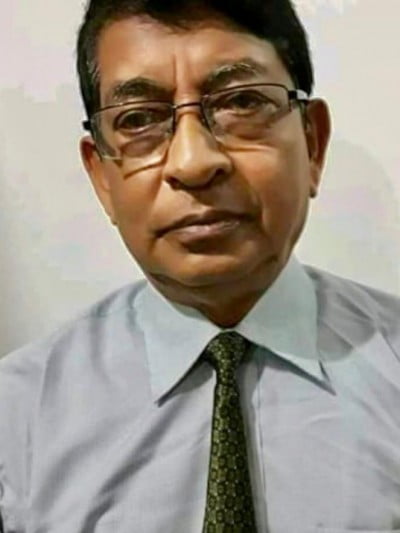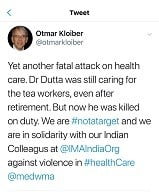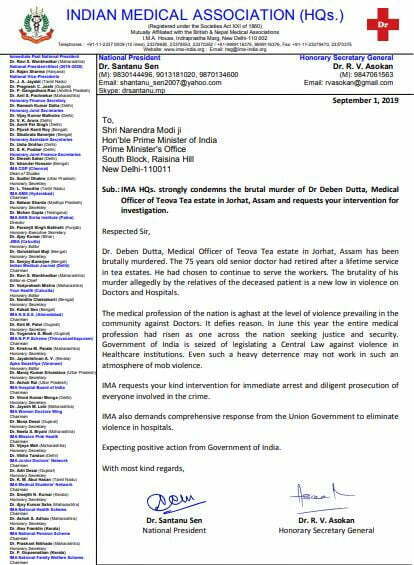
Dr. Deben Dutta, 73, was born and brought up in a tea estate and practically spent his whole life healing the tea estate workers in a one-man nursing home or hospital, by whatever name you may call it. Working as a single and experienced doctor at the Teok Tea Garden in upper Assam’s Jorhat district he delivered many babies and cured many of the tea estate workers but this did not deter them from brutally beating him to death. The unsubstantiated crime for which Dr. Deben Dutta was lynched by an angry mob was negligence resulting in the death of a plantation worker. It was reportedly a case of instant justice – without any investigation or charges being proved in a court of law.

In a shameful act of cruelty, Dr. Dutta wasn’t even given a chance to defend himself. The mob didn’t even allow the ambulance or paramedical staff to administer first aid to the profusely bleeding doctor, while some people brazenly made a video of the brutal assault.
The video in question shows a profusely bleeding Dr. Dutta trying to rest his body against a wooden table, while the floor below him is puddled with thick blood. It was a clear-cut case of might is right.
Dutta, was away at his residence when 32-year-old Sukra Majhi, a tea laborer was brought to Teok Tea Garden Hospital in a seriously injured condition. Dr. Dutta tried to revive him but failed and pronounced him dead after a few hours.
This is when the whole drama started as an irate mob of plantation workers went berserk and began assaulting the hospital staff, for alleged medical negligence. The unruly mob entered the office of Dr. Dutta and started assaulting him. The Tea Garden’s welfare officer, who tried to intervene, was also assaulted.
Dr. Dutta virtually bled to death after receiving multiple injuries due to stones and broken glass. The greatest irony is that the profusely Dr. Dutta who spent almost his entire life caring for the plantation workers wasn’t even allowed to plead for the crowds’ mercy. It was only later that the magistrate and CRPF were managed to take him to the Jorhat Medical College Hospital. But he breathed his last just a few km away and was declared dead on arrival at the hospital.
“This incident sentinels the civilizational crisis of our times. The nation should reflect on the import of the incident which is nothing but savage barbarism. The medical profession of the country is at a loss of words to countenance the sheer savageness unleashed on it,” Dr. Santanu Sen, Indian Medical Association (IMA), National President says.
“The medical profession of the nation is aghast at the level of violence prevailing in the community against Doctors. It defies reason. In June this year, the entire medical profession had risen as one across the nation seeking justice and security. Government of India is seized of legislating a Central Law against violence in Healthcare institutions. Even such a heavy deterrence may not work in such an atmosphere of mob violence,” he adds.
According to President, IMA Assam Chapter, Dr. Satyajit Borah – through the gory and gruesome manner in which Dr. Dutta’s was done to death is unparalleled, there are many stray incidents in which Doctors have been manhandled by irate relatives of a patient. “There are many tea estates based in remote and inaccessible locations with just a single doctor to take care of all the plantation workers 24×7. It is quite understandable that people have high expectations from the doctors and there might be a chance slip-up but does that justify the manner in which people take the law in their hands? This is not acceptable”.
———————XXX———————-XXX—————————–
Assaults on tea-garden doctors are fairly common because the plantation workers are usually inebriated and intoxicated. Last May the friends and relatives of a patient inhumanly mistreated Dr. P Thakur in the Tinsukhiya district in Assam. He survived but with multiple fractures
———————XXX———————-XXX—————————–
Ripun Karmarkar, a doctor at the Sonowal Tea Estate in Mariani, was surrounded by a mob of more than 300 men last December after a patient was brought dead to the hospital. The next day, an angry mob surrounded her quarter – demanding ‘life for a life’. Luckily for her the police arrived and rescued her in time.
———————XXX———————-XXX—————————–
A few years ago, a mob led by a patient’s family rounded up and assaulted the medical staff of Dohela Majakhili, a state-run dispensary in Goalpara district. The staff was asked to stand outside the dispensary with their arms raised.
———————XXX———————-XXX—————————–
Earlier in 2015, the relatives of a woman brutally assaulted a female pediatrician who failed to save a baby delivered in the state-run Mahendra Mohan Choudhury Hospital in Guwhati.
———————XXX———————-XXX—————————–
There have also been assaults reported in Dikom Tea Estate in Dibrugarh district, Bokakhat Tea Estate in Golaghat district, Khumtai Tea Estate among others. But never before has violence resulted in the death of doctors.
———————XXX———————-XXX—————————–
Paradoxically this is not a problem of conflict of interest between doctors and patients in Assam or North-East but trend all over India and the world.
- Just a few days back two resident doctors on duty were brutally beaten by the relatives of a 40-year-old patient suffering from chronic liver disease, hypertension, and other serious complications at the Safdarjung hospital in Delhi. The two resident doctors (RDs) sustained injuries on the face, hand, back, abdomen, and limbs.
- Three resident doctors of the civic-run Nair Hospital in central Mumbai were attacked by kin of a patient, who died during treatment. The incident took place, after Rajkishore Dixit (50), a critically ill patient died during treatment. As soon as he was declared dead, his relatives started hurling abuses and attacked the resident doctors and the security guard besides damaging the hospital property.
According to an online survey conducted by the Centre for Enquiry into Health and Allied Themes, in collaboration with the King Edward Memorial Hospital and Maharashtra Association of Resident Doctors, violence against resident doctors is quite high and widespread.
Of the 193 respondents, 61.7% of Doctors had been exposed to violence by relatives, patients and/or accompanying caregivers. Of these, 76.5% had been exposed to more than one incident of violence as a resident doctor working in a public hospital in Maharashtra.
The most commonly reported violence or abuse includes threat (76.5%), humiliation (57.1%) and pushing/shoving (57.1%). Almost 17.6 percent of the respondents complained of assault.
According to a senior Doctor who did not wish to be identified – such abuses and violence are causing more harm than good as many doctors have started restraining themselves and have stopped taking risks in doubtful or complicated cases, because ‘they too have their families, and don’t wish to die early’.
 These findings are in fact corroborated by a World Health Organization (WHO) study according to which nearly 8% – 38% of health workers are subjected to physical abuse at some point in their career. According to a WHO report, Health workers are at high risk of violence all over the world. Many more are threatened or exposed to verbal aggression. The Health workers become the targets of collective or political violence in disaster and conflict situations, the report says. Most violence is perpetrated by patients and visitors. The nurses, emergency room staff, paramedics and other staff directly involved in patient care are most often face the consequences.
These findings are in fact corroborated by a World Health Organization (WHO) study according to which nearly 8% – 38% of health workers are subjected to physical abuse at some point in their career. According to a WHO report, Health workers are at high risk of violence all over the world. Many more are threatened or exposed to verbal aggression. The Health workers become the targets of collective or political violence in disaster and conflict situations, the report says. Most violence is perpetrated by patients and visitors. The nurses, emergency room staff, paramedics and other staff directly involved in patient care are most often face the consequences.
The WHO has developed methods to systematically collect data on attacks in health facilities.
According to knowledgeable sources, the prime reason behind all this is a lack of formal mechanism, protocols and policies to prevent and address violence against resident doctors. Obviously the hospital administration has to play a critical role to address this problem which cannot be swept under the carpet. There is a need for security guards, CCTV cameras, emergency alarms, along with training and response protocols to deal with violence in the medical environment.
According to experts, the hospital administration should workout standard operating procedures and strategies to prevent overcrowding and restrict visitor entry in the hospital premises. Apart from this, there is a need for senior doctors to be present at critical and sensitive times such as at the time of declaration of death to the patients and relatives. There is a need to be extra careful at night because a majority of such incidents occur during night duty when most senior doctors are not available.
The result is stress, anxiety, and depression among Doctors, nurses, and paramedics. These trend is becoming more and more apparent. According to Indian Medical Association Secretary-General, Dr. RV Asokan suicides amongst doctors are mostly among young doctors who are frustrated because of a lack of opportunities, and extremely poor working conditions. “I would say this is a phase that lasts up to 4 – 5 years after graduation as they complete their MBBS and head for post-graduation. Many of them fail. At least 60-70% of them cannot get entry into PG courses. So there is anger, frustration, and depression.”

“This is a very serious issue. We (IMA) have a committee that looks into stress among young doctors. There is a lot of unrest among young doctors”, he adds.
Violence at work has become an alarming phenomenon worldwide. The real size of the problem is largely unknown and what we know so far is only the tip of the iceberg. It is manifested in the form of physical assault, homicide, verbal abuse, bullying, sexual harassment, and threat. For the healthcare workers who come in direct contact with people in distress, this is a routine phenomenon and an inevitable part of the job.
The ambulance staff is at the greatest risk, followed by nurses who are three times more likely to be exposed to violence in the hospital workplace. Today when a majority of the medical workforce are females, violence at work is a matter of serious and growing concern.
“Today the young Doctors are ready to go anywhere. They just need two things – safety at the places where they go. That is because 50% of the practising doctors today are ladies. There has been a feminization of the medical profession so they need care, they need safety. This has to be ensured. There has to be some amount of professional satisfaction out of serving somewhere. There have to be basic amenities,” says Dr. Asokan.
The IMA Assam State branch – in a letter to the Secretary Assam Branch of the Tea Association has threatened to withdraw all doctors from the tea gardens if adequate steps are not taken to ensure the Doctors safety.
Meanwhile, the IMA Headquarters has requested PM Narender Modi to personally intervene and take necessary steps to eliminate violence in hospitals.

